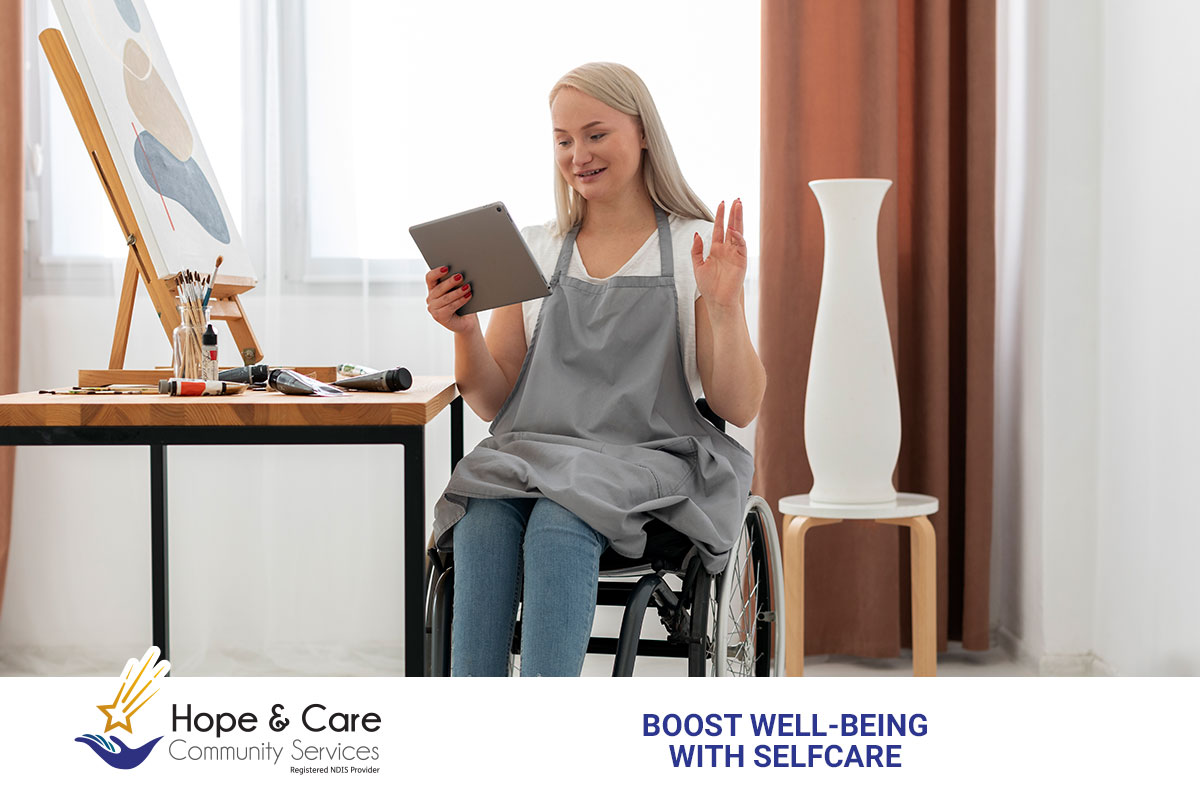
As a NDIS participant, taking care of yourself is essential for maintaining a high quality of life. Self-care practices can significantly improve your mood, reduce stress, and enhance overall well-being. At Hope & Care Community Services, we are dedicated to supporting your journey toward a healthier, happier life. In this article, we will explore various self-care strategies that you can easily integrate into your daily routine, regardless of your physical abilities.
What We Will Learn
In this article, we will discuss:
- The importance of mindfulness and relaxation techniques
- Various exercise and physical activity options
- Healthy eating habits
- Effective sleep hygiene practices
Mindfulness and Relaxation Techniques
Taking a few moments each day to focus on mindfulness and relaxation can help you feel more centred and calmer. Here are some techniques you can try:
- Deep Breathing
Deep breathing exercises can quickly reduce stress and promote relaxation. A simple method involves inhaling for a count of four, holding your breath for a count of seven, and exhaling for a count of eight. This technique helps to slow your heart rate and calm your mind. - Meditation
Meditation is a powerful tool for mental well-being. Find a quiet spot where you can sit or lie down comfortably. Close your eyes and imagine a peaceful scene, such as a serene beach or a quiet forest. Allow your mind to drift and relax. - Progressive Muscle Relaxation
This technique involves tensing and then relaxing different muscle groups in your body. Start with your toes, tensing them for about five seconds before releasing. Gradually work your way up to your head. This practice can help reduce physical tension and promote a sense of relaxation.
To make mindfulness and relaxation a regular part of your day, try setting aside time before bed or during a break at work. Consistency is key to reaping the benefits.
Exercise and Physical Activity
Physical activity is beneficial for both your body and mind. Here are some activities you can incorporate into your routine, tailored to different levels of physical ability:
- Able-Bodied Individuals
Engage in activities such as running, hitting the gym, or cycling. These exercises can boost your cardiovascular health and improve your mood. - People Using Wheelchairs
Try wheelchair push-ups, seated marching, or wheelchair basketball. These activities can strengthen your upper body and provide a good cardiovascular workout. - People with Other Physical Disabilities
Seated yoga, resistance band exercises, or swimming can be excellent choices. Swimming, in particular, is low-impact and can be very gentle on the joints while providing a full-body workout.
If exercising is not feasible for you, focus on other aspects of self-care like eating healthy and getting enough sleep. Physical activity is just one piece of the self-care puzzle.
Healthy Eating Habits
A nutritious diet can provide you with the energy you need to feel your best. Here are some healthy food options to consider:
- Fruits and Vegetables
Incorporate a variety of fruits and vegetables into your diet, such as apples, bananas, carrots, and celery. These foods are rich in vitamins and minerals. - Lean Protein
opt for lean protein sources like grilled chicken, baked fish, or tofu. Protein is essential for muscle repair and growth. - Whole Grains
Whole grains such as brown rice, whole wheat pasta, and oatmeal are excellent choices. They are filling and provide sustained energy.
To eat healthier, try cooking meals at home, packing your lunch for work, and replacing sugary drinks with water or herbal tea. Making small changes can lead to significant improvements in your diet.
Sleep Hygiene
Quality sleep is crucial for both physical and emotional health. Here are some tips to enhance your sleep habits:
- Create a Sleep-Friendly Environment
Keep your bedroom dark, quiet, and cool. A comfortable environment can help you fall asleep faster and stay asleep longer. - Establish a Bedtime Routine
Develop a calming bedtime routine such as reading, listening to soothing music, or taking a warm bath. This can signal to your body that it’s time to wind down. - Consistent Sleep Schedule
Try to go to bed and wake up at the same time every day, even on weekends. Consistency helps regulate your body’s internal clock.
Avoid caffeine and screen time at least an hour before bed to ensure you get the most out of your sleep. Proper rest is vital for maintaining your overall health.
Conclusion
Taking care of yourself is key to a happier, healthier life. Whether you’re practicing mindfulness, engaging in physical activity, eating healthier, or improving your sleep habits, every small step can make a big difference. At Hope & Care Community Services, we are here to support you in your self-care journey, empowering you to live your best life. Embrace these self-care practices and watch your well-being flourish.
Finally, as Registered Provider, we understand the intricacies of the navigating services on your own. Unlock the full potential of your funding and provide the guidance you need to reach your goals. Feel free to Contact Us to explore how we can assist you on your journey. For instance, the NDIS is there to make a positive difference in your life, and we’re here to help!.
Want to learn more? Read other articles :
- NDIS Support Categories & Understanding Your Support Budgets
- Building Lasting Relationships with Your NDIS Providers
- NDIS & ASD: Essential Information for Navigating Support
HCCS is a registered NDIS provider. Learn more about our services.
♥ We are available in Brisbane! – Our team is just a call away!
